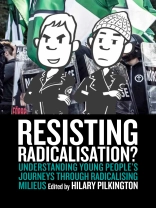This landmark volume of extensive empirical research conducted across Europe explains how, and why, young people become engaged in radical(ising) milieus but also resist radicalisation into violent extremism.
Offering a critical perspective on the concept of radicalisation, this volume views it from the perspective of social actors who engage in radicalising milieus but for the most part have not crossed the threshold into violent extremism. It brings together contributions conducted as part of a cross-European (including France, Germany, the Netherlands, Greece, Russia, Turkey, the UK, and beyond) study of young people’s engagement in ‘extreme right’ and ‘Islamist’ milieus.
It argues that radicalisation is best understood as a relational concept reflecting a social process rooted in relational inequalities but also shaped by interactional and situational dynamics, which not only facilitate but also constrain radicalisation.
สารบัญ
List of Illustrations
Acknowledgements
Introduction: Beyond Endpoints: Rethinking How and Why to Study Radicalisation
Hilary Pilkington
Part I: Cross European Perspectives on Trajectories of (Non)Radicalisation
Chapter 1. Non-Radicalisation under a Magnifying Glass: A Cross-European ‘Milieu Perspective’ on Resistance to Islamist Radical Messaging
Mark Dechesne
Chapter 2. Situating Trajectories of ‘Extreme-Right’ (Non)Radicalisation: The Role of the Radical Milieu
Hilary Pilkington and Viggo Vestel
Part II: Sites and Sources of (Non)Radicalisation
Chapter 3. What Is the Connection between Inequalities and Radicalisation? Reviewing the Evidence Base
Renata Franc, Alexandra Poli and Tomislav Pavlović
Chapter 4. Islam and Violence in Greek Society: The Stigmatisation of Muslims, the Extreme Right and Resistance to Reciprocal Radicalisation
Alexandros Sakellariou
Chapter 5. Family, Relatives and Friendship as Channels of (Non)Radicalisation in the Narratives of the Urban Second Generation of North Caucasian Youth
Sviatoslav Poliakov
Part III: Situational and Interactional Dynamics of (Non)Radicalisation
Chapter 6. Situational and Interactional Dynamics in Trajectories of (Non)Radicalisation: A Micro-Level Analysis of Violence in an ‘Extreme-Right’ Milieu
Hilary Pilkington
Chapter 7. Trajectories of (Non)Radicalisation in a French Prison
Bartolomeo Conti
Chapter 8. Responses to Radical(ising) Messages and Their Messengers by Young Marksmen and their Clubs: From Rejection to Normalisation
Benjamin Kerst
Conclusion: Has Radicalisation Research Reached Its Endpoint?
Hilary Pilkington
Appendix: Overview of Milieus Studied
Index
เกี่ยวกับผู้แต่ง
Hilary Pilkington is Professor of Sociology at the University of Manchester and Fellow of the Academy of Social Sciences. She is author of Loud and Proud: Passion and Politics in the English Defence League (Manchester University Press, 2016), and was awarded the BBC Thinking Allowed Ethnography Award in 2017. She has coordinated major international research projects including the H2020 DARE (Dialogue about Radicalisation and Equality) project












